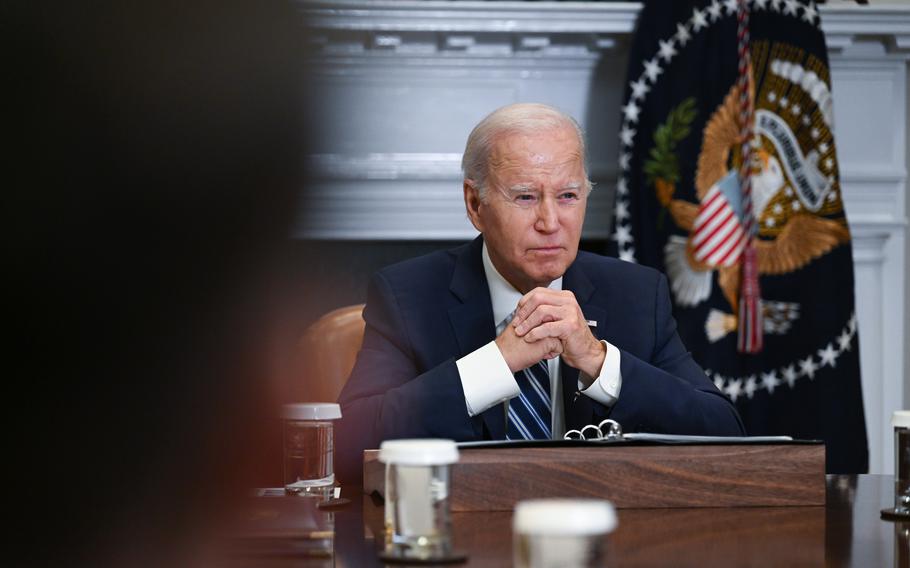
President Biden, seen in November 2023, issued a national security memo on Wednesday calling on federal agencies “to do even more” to stop fentanyl trafficking. (Matt McClain/The Washington Post)
The White House on Wednesday backed proposals to permanently stiffen penalties on synthetic-drug traffickers, monitor machines used to make fentanyl pills and close a loophole that allows criminal groups to easily ship drugs in packages.
President Biden announced the initiatives as state and federal officials from both political parties grapple with how to curb a drug epidemic that has killed more than 300,000 people during his administration.
The crisis is fueled by fentanyl, the potent synthetic opioid manufactured by Mexican criminal groups and smuggled into the United States. Border security has proved to be a political flash point, with Republicans hammering the White House about the failure to stop fentanyl from entering the country.
Biden, who dropped out of the presidential race and is endorsing Vice President Harris against former president Donald Trump, urged Congress to green-light a border security bill.
“These are the key investments needed to stop fentanyl from reaching our communities,” Biden said in a statement. The announcement came six days after the dramatic arrest of longtime senior Sinaloa cartel leader Ismael “El Mayo” Zambada and one of the sons of notorious drug lord Joaquín “El Chapo” Guzmán Loera. The younger Guzmán, Joaquín Guzmán López, pleaded not guilty Tuesday in Chicago federal court. The 76-year-old Zambada remains in federal custody. Guzmán Loera is serving a life prison sentence after his conviction in 2019.
Biden also issued a national security memo calling on federal agencies “to do even more” to stop fentanyl trafficking. The proposals include adopting permanent restrictions on chemical variants of fentanyl often found on the streets.
Under Trump, federal authorities in 2018 temporarily placed all substances related to fentanyl, or analogues, in a category reserved for the riskiest of controlled substances. That category, Schedule I, is reserved for substances such as heroin and LSD, and can result in more severe prison sentences.
The Halt Fentanyl Act, passed in the House with bipartisan support last year, would make the classification of analogues permanent. But critics, including some Senate Democrats, argued the bill would enshrine tough mandatory sentences that would disproportionately affect communities of color, while making it more difficult to research fentanyl variants that might be medically beneficial. “The Biden administration is more committed to maintaining the appearance of vigorous punishment for drug trafficking than learning the lessons of the drug war,” Liz Komar, an attorney for the Sentencing Project, a D.C. nonprofit organization that advocates for more humane sentences, said Tuesday.
Fentanyl itself, which can be prescribed by doctors as a legal painkiller, is classified as a Schedule II controlled substance. Illicit fentanyl has flooded the United States alongside its analogues, compounds similar in molecular structure and often just as deadly, if not more so.
A senior Biden administration official said the proposals also include making xylazine, the animal tranquilizer that is increasingly added to fentanyl and causes skin infections, a Schedule III substance, mirroring bills with bipartisan support. The measure would make dealing in xylazine a federal crime, although there would be exceptions for legitimate veterinarian use.
Biden also proposed creating a national registry that would allow law enforcement to track presses used to make fentanyl pills disguised as legal prescription drugs. Last year, the Drug Enforcement Administration seized nearly 80 million fake pills, most containing fentanyl. The machines are easily purchased online. The agency has warned e-commerce companies that they are required to report sales of the machines to law enforcement.
For federal law enforcement, disrupting the global synthetic drug supply chain has proved vexing. Mexican criminal groups secure precursor chemicals from China, which arrive through the mail.
The Justice Department has increasingly targeted Chinese nationals and companies accused of knowingly dealing the chemicals to organized-crime groups. Last fall, as Biden met with Chinese leader Xi Jinping, Beijing agreed to step up counternarcotics cooperation targeting the country’s vast chemical industry.
In June, a 48-year-old Chinese national was arrested in New York on allegations that he participated in a plot to import more than 2,000 kilograms of precursor chemicals from China into the United States and bound for Mexico. The shipments entered the country without a detailed inspection of the contents, the Justice Department said.
The White House proposal would also make it easier for border officials to “track and target the millions of small-dollar shipments that cross our borders every day - closing a loophole that drug traffickers exploit.”
The White House did not offer details, but members of Congress have introduced legislation to close the “de minimis loophole” that allows parcels valued at less than $800 to avoid customs duties - leading to a dramatic increase in packages from Chinese e-commerce companies.
Last week, families of fentanyl victims, law enforcement officials and nonprofit groups sent a letter to Biden saying the loophole lets bad actors hide counterfeit pills, chemicals used to make fentanyl and pill presses among the millions of packages that arrive daily from abroad. Rep. Earl Blumenauer (D-Ore.), who has sponsored a bill to close the loophole, welcomed Biden’s proposed measures. In a statement on Wednesday, Blumenauer said China’s “abuse” of the loophole is to blame for fentanyl and precursor chemicals “ravaging our country.”
“I welcome today’s announcement, but it does not negate the need for Congress to act on my proposal to close the deadly de minimis loophole once and for all,” Blumenauer said.